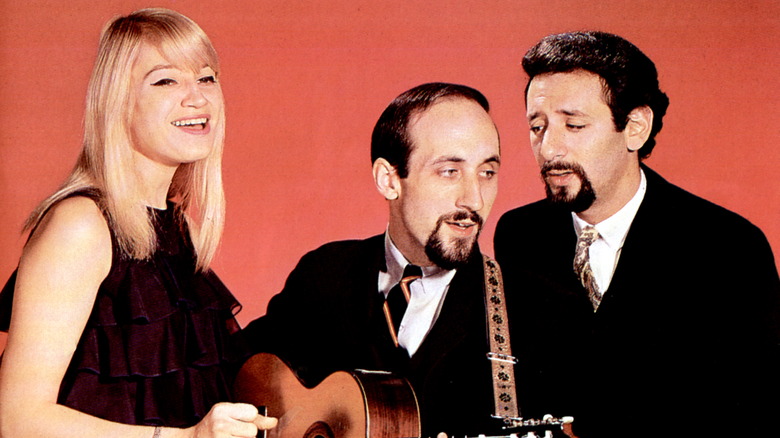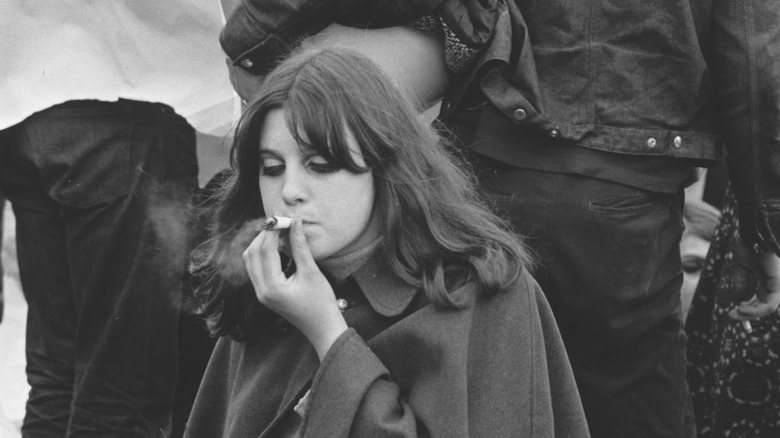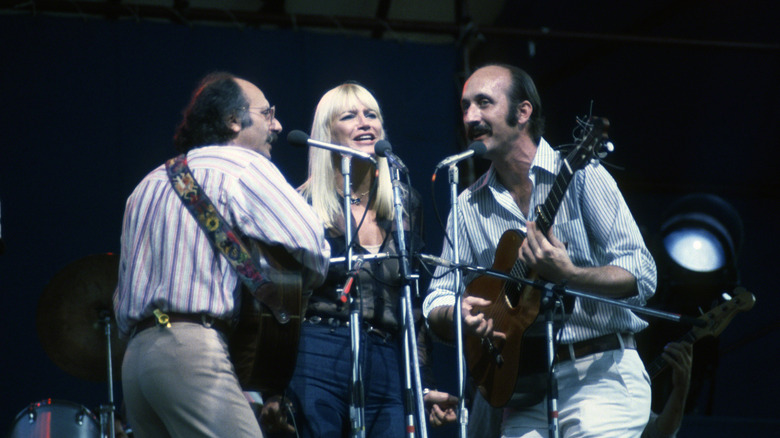The Real Meaning Behind Puff The Magic Dragon
Ah, "Puff, the Magic Dragon," by Peter, Paul, and Mary — what a stone-cold '60s classic. And, what's more, a family-friendly classic about a young boy and his loyal dragon friend and their adventures together. Beautiful. No wonder it flew up the charts shortly after its release in 1963, peaking at No. 2 on the Billboard Hot 100 in March of that year and staying on the chart for a total of 14 weeks. All very wholesome ... but it's actually about smoking dope, isn't it?
That's what popular opinion would have you believe. And, quite honestly, it's not so big a stretch of the imagination to see that "Puff" could easily be a '60s drug song in the style of, say, The Beatles' "Lucy in the Sky with Diamonds." Some have noted the title is an acronym for LSD and believe the song is actually about the drug (it must be added that John Lennon, the primary songwriter, always denied the drug connection). The name "Puff" certainly sounds like a smoking reference, while the idea of a magic dragon is, well, a bit druggy, right? But while generations of weed smokers have blown each other's minds by analyzing the song as a drug allegory, its creators have made it quite clear that drug taking was the last thing on their minds when they came up with "Puff." They say that despite the apparent subtext, the themes are all there to be taken at face value in the lyrics: We all eventually grow up, turn away from the world of imagination, and lose our innocence with it.
Is puff really about smoking trees?
Suspicions over the true meaning of Peter, Paul, and Mary's "Puff, the Magic Dragon" — originally known simply as "Puff" — are understandable when you look at the lyrics and see that it is loaded with potential references to smoking grass ... though some are perhaps a little more far-fetched than others.
The most memorable lyrics of "Puff" are the first two lines of the refrain, which also opens the song: "Puff, the magic dragon lived by the sea / And frolicked in the autumn mist in a land called Honalee." Autumn mist could easily be interpreted as the second smoke reference in two lines, while several other descriptions of Puff and his adventures seem to suggest it really is about Mary Jane. For a start, it is also revealed that Puff is green — like cannabis — and that he plays in a place called Cherry Lane, which could be a reference to the "cherry" at the end of a lit cigarette. It was also speculated that Puff's friend, a little boy named Jackie Paper, symbolized rolling papers, and that Honalee — the nonexistent home of Puff and Jackie — was an alternate spelling of Hanalei, a Hawaiian village where marijuana was grown.
But while such theories spread into the public imagination and were even shared by letter in national newspapers such as The New York Times, the songwriters have been adamant that those who saw Puff as a cipher for pot smoking did so misguidedly.
The truth about Puff
In the late 1950s, Peter Yarrow — who would later find fame as a performer and primary songwriter in Peter, Paul, and Mary — was studying physics at Cornell University. There, he was friends with another physics major named Lenny Lipton, who, inspired by the Ogden Nash poem "The Tale of Custard the Dragon," sat down to write his own poem about a dragon at Yarrow's typewriter. Yarrow later set the poem to music, making sure to credit his college buddy as a co-writer before incorporating "Puff" into the Peter, Paul, and Mary repertoire. Both Lipton and Yarrow have categorically denied that the song is a reference to smoking pot. "We're talking about Cornell in 1958[,]" Lipton later recalled on his blog. "People were going to hootenannies — they weren't smoking joints."
Instead, the theme of the song is about growing up and the loss of childlike imagination. In the final verses of the song, Jackie Paper ceases to play with Puff, who slips away into his cave, destined to be forgotten by the child who created him. A seemingly innocent song about the loss of innocence, which has been roundly interpreted as being about drug taking by the world at large. How ironic is that?


